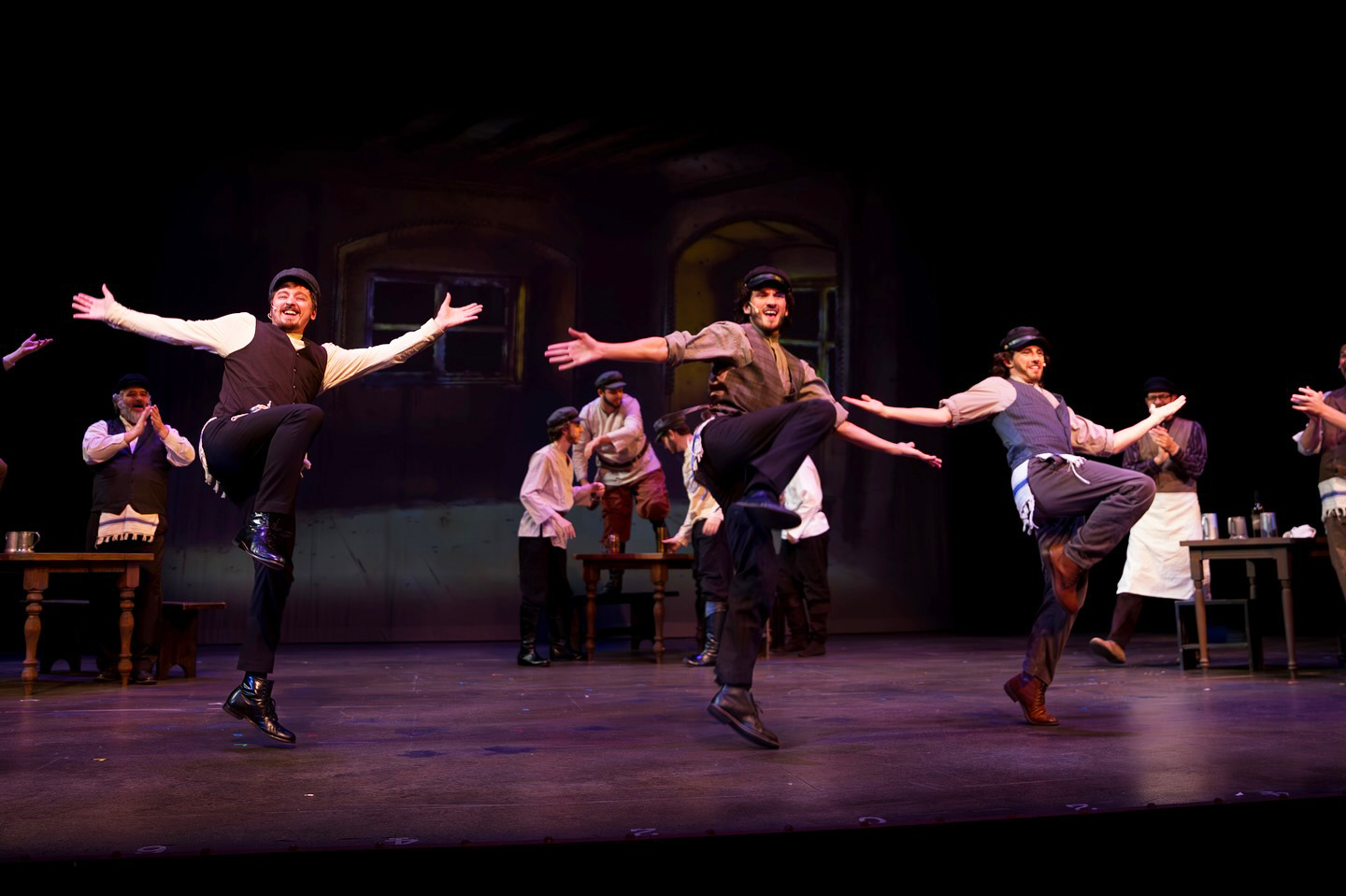The WordPlayers present Bock, Harnick, and Stein’s classic 1964 musical Fiddler on the Roof at the Clarence Brown Theatre. Director Leann Dickson brings together some of Knoxville’s finest performers—actors, artists, and musicians—for a beautifully bittersweet production of one of musical theatre’s classic staples. Featuring a live orchestral performance in one of Knoxville’s best-known playhouses, Dickson’s and The WordPlayers’s Fiddler is a spectacular show that brings out the best of the original text and the individual artistries of its cast and crew.
Dan Maxwell as Jewish dairy farmer Tevye is as lovable as papas can be, and his struggle between maintaining the traditions of his rural Russian Jewish community and faith and respecting the wishes of his headstrong daughters is as relevant today as it was at Fiddler’s debut. Maxwell is a deft performer, moving us from joyous celebration during “To Life” to bittersweet tears during the “Chava Sequence.” Nancy Duckles as Golde, Tevye’s wife, runs a tight ship with the tough motherly love of those for whom hardship is a fact of life. “The Dream” sequence frees Duckles from some of Golde’s rigidity, and the whole dreamscape is wild and whimsical, with humorously vindictive performances from Grandmother Tzeitel (Jessica Magers-Rankin) and Fruma-Sarah (Stephanie Miles). Michala Plato as Tzeitel, Tevye’s eldest daughter, is gentle yet firm in her declaration of love for Motel (Caleb Leach), and in their tenderness toward one another, especially in Leach’s performance of “Miracle of Miracles,” the pair make a convincing case for love over traditional matchmaking that wins over Tevya’s heart (and ours). Hodel (Madison Anderson) is the quickest-witted of the daughters, and Anderson’s snappy delivery emphasizes her headstrong will and self-sacrificing love for the urbanite student Perchik (Nathan Fink). Their performance of “Now I Have Everything” confirms their affections for one another, even if Perchik can only seem to rationalize his feelings in a utilitarian way. Chava (Abigail Tardy) is perhaps the most tragic daughter role in Fiddler, and Tardy demonstrates Chava’s calm strength amid the crisis of her interfaith elopement to the Christian Fyedka (Tristan Hall).
These small revolutions within the community are punctuated by the looming political changes that creep ever-closer to Anatevka life with the Russian Revolution on the horizon. Josh Brady as Constable is an imposing presence whose relationship with the Jewish community of Anatevka is malleable; despite his wary tenderness for the community, Brady’s Constable still menacingly swaggers on stage to serve the orders of his Tsar at the most inopportune times. Frannie Hamrick as Anatevka’s designated matchmaker Yenta slowly loses her power within her community as Tevya’s daughters take their matrimonial fates into their own hands. And Sean Claire as the titular Fiddler reminds the residents of Anatevka, as well as the audience, that change is inevitable—our lives are as stable as a fiddler on the roof. As a professional violinist with the Knoxville Symphony Orchestra, Claire might be suited to that sort of balancing act; his onstage performances, in addition to the accompaniment of a live orchestra led by Music Director Sheryl Howard, are a beautiful rendering of this production’s most touching moments [No fiddlers were harmed in the making of this musical.]
Set against a backdrop of rural and urban landscapes designed by Projections Designer Allison Bucher, The WordPlayers’s Fiddler is a tender and faithful rendition of a musical theater classic. This production shows, as this musical does time and time again, that we can learn from each other and feel for each other despite cultural differences. We share the same feelings during weddings and other celebrations, whether we participate in highly dexterous folk dances (choreographed by Ashley Williams) or do the Macarena or the Cha Cha Slide. Costume Designer Edina Bobrek wedded provincial attire with subtle modern influences, drawing parallels between the revolutionary early 20th century and our current time. And toward the end of the production, while the exiled villagers of Anatevka pack up their things for their journeys across the globe, a small band of travelers, in contemporary clothing, blend their way into the eddy of refugees; it is a stark reminder that immigration and refugee crises are definitely not a thing of the past.







